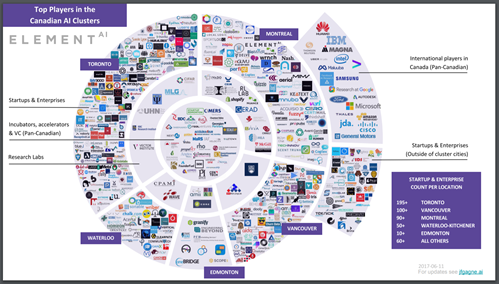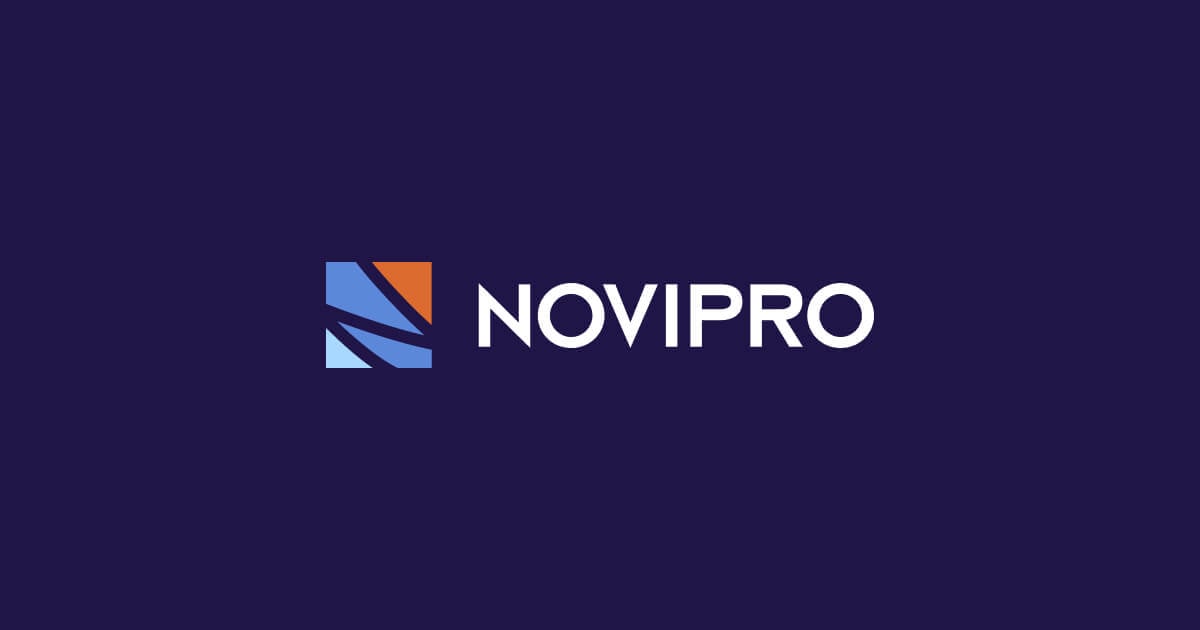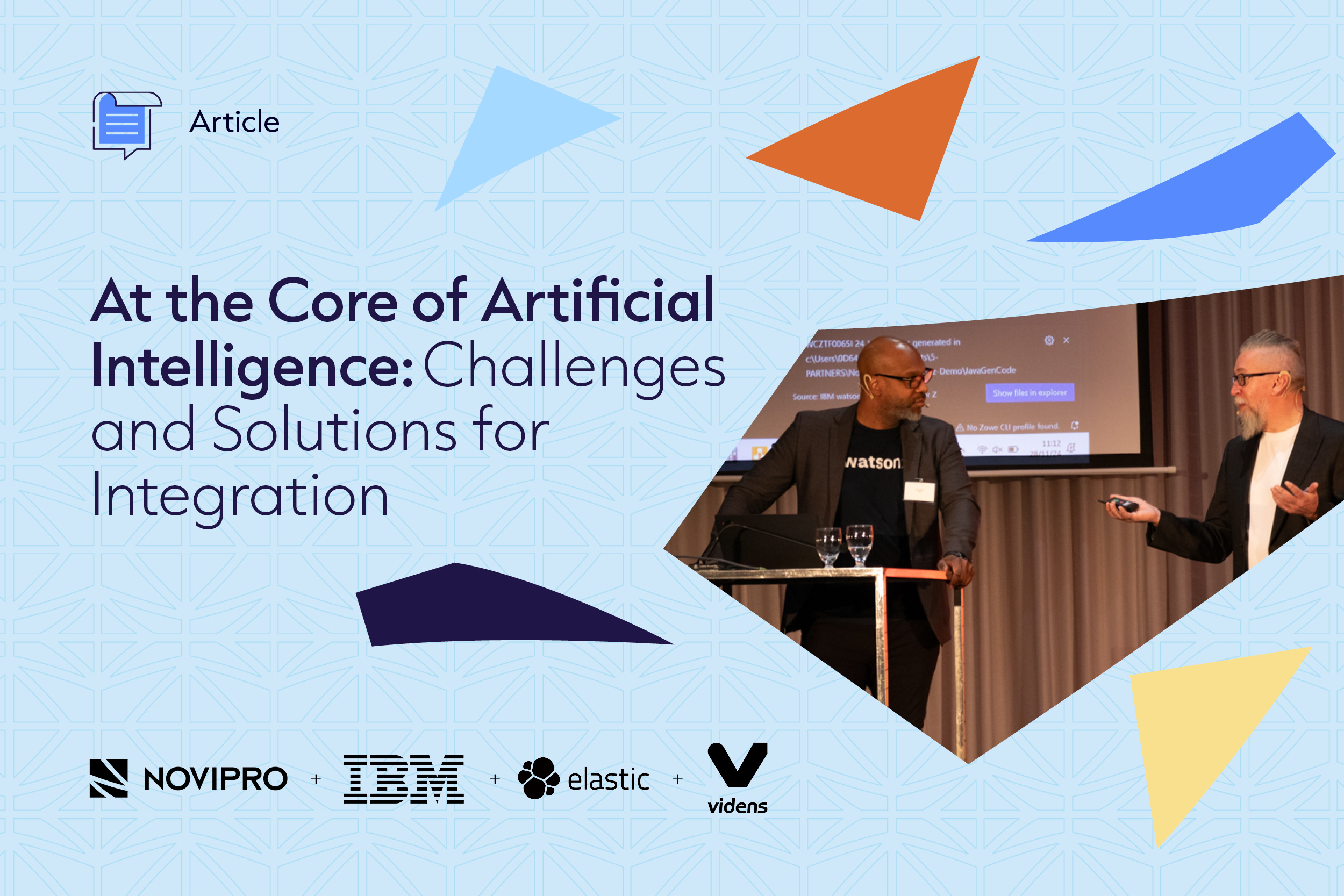We recently had the chance to attend the Strategic Forum on Artificial Intelligence, an event organized by the Montreal Metropolitan Chamber of Commerce (CCMM). The various presentations were very interesting, but discussions remained quite general. Overall, it was a good opportunity for business leaders to familiarize themselves with the field and gain an understanding of what it’s all about.
Following the publication of our article on big data in Canada, we thought it would be a good idea to take a look at the country’s artificial intelligence (AI) industry.
You’ve probably heard of recent investments in AI in Canada. The federal government, Microsoft, Google and Facebook are all investing heavily in research.
That’s because Canada is home to at least three universities with notable machine intelligence research centres. There’s the University of Montreal’s MILA, the Vector Institute (which is not a research centre but is affiliated with the University of Toronto) and the University of Alberta’s Amii research lab. A lot is being discovered about machine learning from one coast to the other—and it’s not a new phenomenon. With the first Canadian funding program for AI dating back to 1983, you might say that Canada has a long history in the field!
These days, there’s a lot of media buzz around these AI hubs and the international funding that they are attracting. This homegrown expertise is certainly great news for the country’s international academic recognition, but what does it mean for Canadian businesses?
For the average company, AI is just one of the many technologies out there that can be used to improve business processes and, ultimately, help boost revenues or reduce costs. From a business standpoint, there’s no other reason to be interested in AI—after all, technology is only useful if it generates a positive return on investment.
Canada’s research centres
Across the country, there are university research centres, chairs and labs that specialize in the broad field of big data.
Some focus on data science, AI, machine learning or deep learning. Their work involves input from specialists in computer engineering, mathematics, statistics, operational research and even management. Other more niche research happens in the areas of computational biology and machine intelligence in healthcare.
Several major universities have research centres dedicated to these fields, but a few really stand out, including the three mentioned above. Of course, that doesn’t mean that things are quiet in the other provinces, but for the sake of brevity, we’ll just mention a few others.


Several of these labs have received sizeable grants from different levels of government and private corporations. In 2016, IVADO was given $93.6 million from the Canada First Research Excellence Fund. MILA, an institute that works jointly with IVADO, has been granted $4.5 million from Google, $7 million from Microsoft and $7 million from Facebook since 2016. In 2017, the Vector Institute, which is associated with the University of Toronto but is not an academic lab, was awarded $50 million from Ottawa, $50 million from the Government of Ontario and an impressive $80 million from some 30 private companies, including Google and major Canadian banks.
These research centres don’t just do fundamental research, such as improving an algorithm for image recognition. They also conduct applied research on how these algorithms can be applied in a broader context. Using the same example, while it’s important to improve the image recognition algorithm, it’s even more relevant to apply the algorithm to a real problem. The driverless car, for example, does not use an algorithm for autonomous driving. Rather, it relies on image recognition technologies that can “see” what is happening on the road. When used with other algorithms and technologies, this makes it possible for the vehicle to drive itself.
That’s exactly what private companies are trying to do by creating research labs, many of which were set up in Montreal in the last year. These include Google (Google Brain), Facebook, Microsoft through its acquisition of startup Maluuba, Korean manufacturer Samsung, France’s Thales and Canadian bank RBC. Most either collaborate with MILA or seek to capitalize on the AI boom in Canada. In other words, these companies are creating AI research and development clusters right where the expertise is available in the hopes of improving their products and services.
All this is good news for corporations, since the advancements don’t just concern algorithms. They are concrete developments that can be applied to their businesses.
Fledgling AI enterprises
Of course, not all the work is being done in research labs. Countless startups are emerging across the country. While researching which ones are using AI as the cornerstone for their products and services, I came across a blog authored by Jean-François Gagné, one of the founders of Element AI. His blog offers a great overview of the latest developments in Canada.


Source: http://www.jfgagne.ai/s/Canadian-AI-ecosystem.pdf
That’s a lot of people! To simplify matters, we could divide the companies into two categories: those that offer a product that uses AI and those that offer consulting and custom services.
In the product category, there are companies like Hopper, which uses big data and machine learning algorithms to predict the price of airline tickets and post results on a mobile app. Even though it’s a B2C service, it’s also the type of solution that a company could use for its flight purchase process (especially since the app is free!).
In Canada and around the world, startups have successfully created products and services based on advancements in machine learning research. Why does this matter? Well, recall that while an image recognition algorithm may do a great job telling the difference between the letters “a” and “e,” such an algorithm, in itself, would not be particularly useful to businesses. But that changes when it’s included in an app that can “read” a handwritten text and automatically transcribe it into a document. It’s the same with natural language processing algorithms; they’re only valuable when packaged in a product like Siri, which can interact with users, or in a chatbot, which can understand a bank customer’s request to change plans and then automatically make the switch, with no intervention required by either the customer or an employee).
In the consulting category, there are firms like integrate.ai in Toronto and Element AI in Montreal, which we mentioned previously. The latter was co-founded by Yoshua Bengio, head of the MILA research centre and eminent authority in the field of deep learning. He is often invited by the media to talk about AI and was present at the CCMM forum in January 2018. This type of startup usually employs specialized researchers and helps emerging companies use AI products to meet their real business needs. It’s what is called AI-as-a-service or AIaaS.
This links back to what we said earlier: there’s no point in implementing a technology if it doesn’t lead to a financial gain. For example, a bank may choose to work with a consulting startup to find ways to incorporate machine learning algorithms into their analysis and fraud-prevention processes with a view to improving detection within legacy systems.
Lastly, there are incubators and venture capitalists that promote the development of AI startups. And naturally, these may be located outside the country.
Major corporations leading the way
As is the case with big data, it is mostly major corporations that have taken the plunge into AI—at least for the time being. That’s because they have a lot of historical data and customers they need to please. And also because they have the budget! Several Canadian banks have set up hubs for machine learning, deep learning and AI in the hopes of innovating their practices and getting a leg up on the competition. The race is on!
TD Bank is a great example. Soon, they will be adding a chatbot to their mobile app. TD also recently acquired an AI startup that developed a platform for analyzing various data sources to learn about and anticipate customer needs. It’s possible that the acquisition was made to prevent competitors from accessing this technology. While that’s a perfectly legitimate business practice, it can slow the adoption of the same technology by businesses operating in other industries.
Meanwhile, RBC is planning on opening a new location of its research lab, Borealis AI. The RBC Institute for Research already has labs in Toronto and Edmonton, and the latest will be in Montreal, where it will collaborate with local universities. In fact, it’s more like a university research centre than a startup with a clearly defined business model—except that its findings will almost certainly be incorporated into the bank’s business processes. After all, the initiative is an investment.
While most of the buzz surrounds big companies, there’s nothing stopping a smaller enterprise within the startup ecosystem from snapping up one of these products to improve its operations. A simple example: nowadays, it’s very easy to access a virtual assistant. Companies like Do You Dream Up offer this product as software-as-a-service (SaaS) that can be added to a website or app. You don’t need in-house machine learning experts—it’s all done remotely by the startup.
Canada’s position on the international stage
While Canada is known for its quality research and teaching, we’re not the only ones active in the field. And being complacent won’t help us stay at the forefront. There’s no doubt that the research will continue for years to come, but according to Yoshua Bengio, who heads MILA, Canada may not be able to benefit from the findings if there aren’t enough local businesses using them.
We can see this as a risk. If researchers from Canadian universities and research centres don’t establish companies that offer products or services based on their AI developments, all this progress will help advance an economy other than our own. We have the raw product (i.e., a combination of expertise, know-how and advancements in data processing science), but what businesses want to buy is a finished product, like an application or innovative solution that will enhance the value of their operations.
So what we need are practical businesses and jobs in AI. Thanks to our fast-growing ecosystem of universities, research centres and incubators, Canada should be able to compete and succeed.
One of the current challenges is that despite the millions of dollars that have been invested in Canada, our startups are under-funded compared to their American counterparts. Last year, venture capitalists injected $3.2 billion into Canada, compared to $69.1 billion in the United States! There’s a risk that all the brains trained across the country could cross the border and register their businesses in Delaware.
As we can well imagine, the competition in AI developments is coming mainly from the United States and China. The Chinese government wants its part of the pie so badly that it plans to invest hundreds of billions of yuan in AI technology and businesses. But at the end of the day, it doesn’t matter who runs the fastest. As long as we are able to build apps with data that can think as well as humans—or better—we will have succeeded.
Conclusion
Artificial intelligence is just a sub-field when it comes to the concrete application of big data analysis. Since AI is such a complex field, any company that wants to capitalize on it must first have a solid understanding of basic analytical fields, such as business intelligence, predictive analysis and machine learning, real time analytics and data governance. Of course, it’s different if the company simply wants to use a product that can be packaged into one of its processes. But in all other cases, you have to know the basics through and through. It simply wouldn’t make sense to hire an advanced AI specialist if your company hasn’t explored the limits of business intelligence first!
The trends we are seeing with AI are the same as what happened with big data. Major corporations are the first to jump in because they know that if they wait, their competitors will get ahead and capture their market share. Their zeal is better than inertia, but it can also seem like a stretch when companies boast to the media that they are delving deep into AI when their customers hate their mobile app and have persistent complaints about their customer service.
At NOVIPRO, we help our clients make the digital shift. Our goal is to understand your business context and processes so that we can recommend the best solutions for you—and make sure they are put to use effectively. If you’re curious about a specific technology or would like to review your business processes, give us a call. We’d be happy to assist you!
Sources :
- http://www.investquebec.com/international/fr/secteurs-activite-economique/technologies-information-communications/Montreal-centre-mondial-de-l-intelligence-artificielle.html
- https://www.cifar.ca/timeline/milestones/artificial-intelligence-robotics-society-launches/
- http://td.mediaroom.com/2017-10-04-TD-announces-conversational-AI-platform-agreement-with-Kasisto
- https://td.mediaroom.com/2018-01-09-TD-Bank-Group-acquires-artificial-intelligence-innovator-Layer-6
- http://www.rbc.com/nouvelles/news/2017/20171121-borealis.html
- http://ici.radio-canada.ca/nouvelle/1059012/intelligence-artificielle-risque-developpement-local-montreal
- https://dmz.ryerson.ca/artificial-intelligence/
- https://www.technologyreview.com/s/609038/chinas-ai-awakening/








